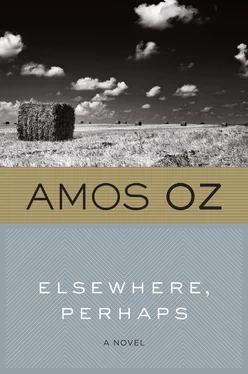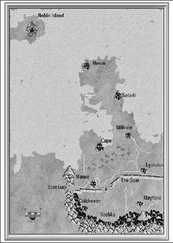The sanitary officer promised he would come before lunch. Fruma said she wanted to see it done with her own eyes.
She started back toward the nursery. On the way she saw a yellow kitten playing with a ball on the lawn. She stopped and watched. She felt a quiet sorrow. Living creature with gentle movements. Agile. Supple. Light. The sight of it surprised Fruma. She smiled a bitter smile to herself. But the ball, why didn't I notice sooner, the ball belongs to the little children.
Fruma bent down to pick up the ball. As she did so, she heard a fine, grating whistle in her ears. She turned her head to see where the sound was coming from. As she turned her head her body turned too. She sank down on the grass, and her face ran with sweat. She tried to wipe it off with her apron. Her hand shook, and fell. Fruma summoned all her strength and tried to get up, because she could see someone coming toward her and she was ashamed to be seen lying on the grass in the early morning. She let out a hollow sob. She collapsed. Ido Zohar hurried up to her and asked if she felt ill. Fruma's face was crumpled and angry. Her eyes were damp. Ido felt he was disturbing her. He turned to go. After ten paces he changed his mind and tried to lift her. Fruma's body was heavy. Ido was embarrassed to be clasping her arms in his. He shouted. Fruma's lips whispered. Now her eyes began to run, and big tears licked her bony cheeks. Her breathing was heavy and uneven. Suddenly her lips parted, and all her teeth showed. Ido was alarmed and shouted again. Running footsteps sounded. Dafna Isarov, trembling, came up and asked what was wrong. Ido hissed twice: the doctor, fetch the doctor. Dafna flushed. Fruma fixed the boy's face with a chill gray piercing look. Ido had an idea and asked if she wanted some water. Fruma said nothing. The look with which she held Ido's face was not alive.
Later, as if through a gray mist, Herzl Goldring and Mendel Morag appeared and carried Fruma off. They put her frail arms round their shoulders. Held in the two men's embrace, Fruma was taken to the surgery. The doctor tried an intracardiac injection and prolonged artificial respiration. He said to Herzl Goldring:
"There's hope yet. Run and get a car, quickly. To the hospital."
The concerted efforts seemed to have had some effect. Fruma's face quivered slightly, the muscles of her jaw relaxed, her mouth opened, and her fingers slowly clenched. The doctor checked her pulse. Finally, he shook his head and said faintly:
"Only a reflex action."
Herzl Goldring burst in to announce that the car was waiting. The doctor said it would not be needed. For some reason he added:
"Thank you very much, Herzl."
At two o'clock in the afternoon Rami arrived. Herbert Segal led him to his room and sat him down in an armchair.
Rami said:
"So suddenly, they told me… suddenly, they said, suddenly."
Herbert covered his round glasses with his little hand and said:
"It can't be helped."
Rami fixed him with a tired look. After a moment he muttered:
"What a terrible thing. So suddenly."
Herbert touched Rami's shoulder.
"Be brave, my boy."
The remark was meant to encourage him, but in fact it had the opposite effect. Rami dropped his head onto the table and began to sob. His voice was loud and strange, almost like stifled laughter. Herbert gave him a glass of cold water. Rami opened his eyes and looked at Herbert Segal as though he did not recognize him. His eyes were dry. He reached for the glass and took a sip. Then, with sudden resolution, he pushed the glass away. Herbert stood up, went over to the window, and closed the shutters. Rami asked hesitantly if he could see… her. Herbert answered firmly: No. Not now.
Silence.
Herbert broke the silence to ask if there were any relatives who should be informed. For a moment Rami had difficulty in remembering. Then he said that there was Mother's sister in Kiryat Hayim and also Father's nephew's family in Rishon-le-Tsion. We haven't seen them since the last funeral. Yoash's. A moment later he added:
"Mother doesn't like them. They're very selfish. They think only of themselves."
Herbert said:
"That doesn't matter now."
Rami suddenly noticed the clothes he was wearing, and sobbed:
"I… I've come straight from training. Look, Herbert, my clothes are filthy. It… It isn't possible… So suddenly…"
Herbert repeated:
"It doesn't matter. It's not important now, what you're wearing."
Suddenly Rami, as if recalling an essential formula, asked how the accident had happened. When. Where. Herbert answered each question with extreme brevity. Rami did not seem to be listening properly. He leaned back heavily in the armchair. Closed his eyes. Crossed his legs. Then he changed his mind, and stretched them out in front of him.
Herbert went out for a few minutes on urgent business. When he returned, he found the boy unnaturally calm, as if he had had a long sleep in the meantime. Unnaturally calmly he said:
"Summer will soon be over. I'll be sent on a course to become a corporal, and Noga Harish will have a son."
Herbert looked at Rami long and hard. At that moment an exciting idea occurred to him. As usual with him, his lips tightened to a narrow straight line.
Mourning descended on Metsudat Ram. No one except Herbert Segal stopped working, because mourning does not interrupt work. But everywhere people worked silently, almost sullenly. Tsvi Ramigolski took Mundek Zohar with him to dig the grave. Tsvi had already telephoned a notice of the death to the newspaper of the kibbutz movement. Now he picked up a spade and went with Mundek to the cemetery. For a long time Tsvi had not done any physical work apart from gardening. His hands blistered, and he panted. He was fat, and his shoulders sagged slightly. The soil was hard, dry, and stubborn. The spades clanged. The cemetery was on the edge of the pine wood. There was a continuous moaning from the pines.
Should Fruma's grave be dug next to that of her husband Alter, or by that of her son Yoash, in the section opposite. Mundek Zohar refused to offer an opinion. Tsvi pondered with his eyes closed. Finally he said:
"Of course, next to Alter. That's right. Husband and wife together. I hate death," he added suddenly, in an uncharacteristic outburst of rage.
The soil, as we have said, was hard. The spades gave out a metallic sound. And the stones gave out a stony sound.
That evening the entrance to the dining hall was draped with black crepe. Without any prior arrangement all the members of the kibbutz assembled after supper in the dark square outside the hall. Little Was said. Faces were serious. At seven o'clock a small group, including Reuven and Bronka, Gerda and Mundek, went to Herbert Segal's room to keep the orphan company. Rami was still sitting in the same armchair; only his feet were propped up on a small stool that Herbert had thoughtfully provided. They sat down.
Reuven Harish sighed and said:
"Remember, Rami, you're not alone. You have a home."
Rami nodded and said nothing.
Gerda said:
"Have you eaten anything?"
As the boy did not reply or even look at her, she turned to Herbert Segal and asked him:
"Has he eaten?"
Herbert made a worried gesture as if to ask her to leave him alone.
Tsvi Ramigolski remarked hesitantly:
"Winter is coming. A decision will have to be made about the Camel's Field. We're in for a difficult time."
After a short silence Rami observed:
"Those twenty-three dunams aren't worth all the fuss."
Herbert half smiled at Tsvi Ramigolski, as if to say: Well done, the boy's talking at last. Keep it up. Tsvi took the hint and continued:
"We must never give in over land. Land is the most important thing in the world."
Rami asked for a cigarette. Mundek Zohar hurriedly offered him one. The boy took a drag and extended his jaw. He drew the smoke down into his lungs and closed his eyes. Without opening them, he said:
Читать дальше












